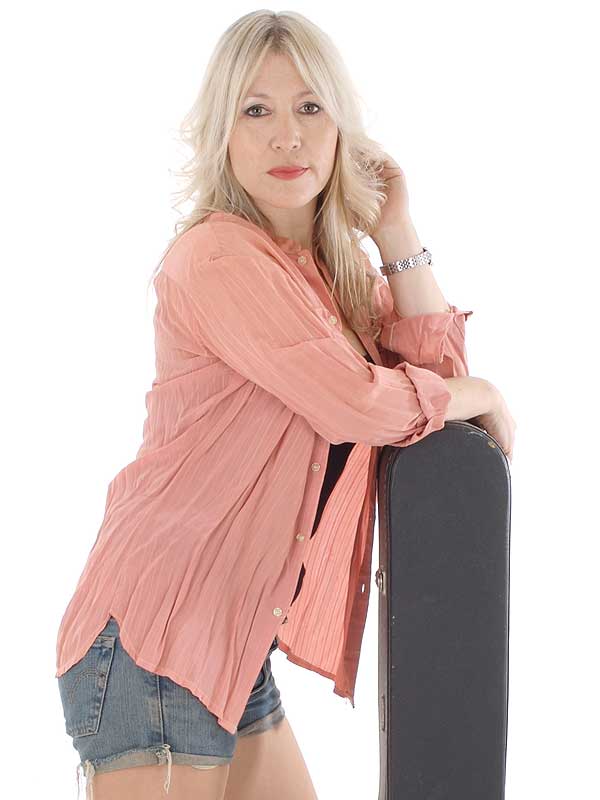The WiMN’s Front and Center is a weekly column that showcases accomplished women who work in the music and audio industries. We spotlight successful female performers, manufacturers, retailers, educators, managers, publicists, and everyone else in between. Want to be featured? Learn how here.
Front and Center: Argentinian Singer-Songwriter and Music Journalist, Laura Goldar
By Pauline France

Laura Goldar’s career is a beautiful convergence of music, marketing and journalism.
Hailing from Buenos Aires, Argentina, Goldar is a guitarist, singer-songwriter, and composer, as well as the editor for Todo Guitarra y Bajo (Everything Guitar and Bass), Argentina’s only magazine devoted to guitar and bass.
Despite being on the southernmost tip of the American continent, Goldar and her business partner Marcelo Roascio have a global footprint and a connection with the music products industry that is felt worldwide through the magazine.
As a musician, Goldar released her album Maravillosa Vida (Wonderful Life) in 2012, and has another project in the works due before the end of 2016. She is a well-known respected figure and music industry expert in Argentina, and has had several TV appearances in her native country.
In the interview below, Goldar discusses gender equality in Argentina, how musicians are perceived in her country, why she thinks so many talented artists originate in Argentina, plus a lot more.
Learn more about Goldar at Facebook.com/LauraGoldarMusica and YouTube.com/LauraGoldar.
WiMN: Argentina has brewed some serious musical talent throughout the years like Gustavo Cerati, Los Arcontes, Los Enanitos Verdes, and of course yourself. What do you think it is about the country that has lead to the creation of such talented musicians?
LG: First, thanks for such a compliment, especially when you mention Gustavo Cerati, an immense artist whose work is so valued in many countries. In regard to Argentina, I would say that it is maybe a sum of things. We are a mixture of many races and cultures, and I think this gives us a wealth of different music styles.
WiMN: In many Latin-American countries, music isn’t taken seriously as a career. Do you find that to be the case in Argentina, or are people usually accepting of music as a career?
LG: Yes and no. On one hand, there are very good music schools in Argentina with official titles backed by the Argentine government, which also have a large attendance of students from other Latin American countries.
On the other hand, there are specific opportunities to be a professional musician, which are not many. Also, the outlook on music as a professional career in our country is changing for good.
WiMN: When did you release Maravillosa Vida? Do you have an album currently in the works?
LG: Maravillosa Vida was released in 2012, and for different reasons it was not well-managed in terms of global distribution. I think it’s a very strong album, and luckily today it has a new opportunity, as it will be re released on all virtual record stores by Poley Records.
I’m also currently working on the production of a new album that will surely be released by the end of the year. There will be some song previews released by the label on the web.
On my live shows, I’m currently doing some of the new songs with my band.
WiMN: Tell us about your career in marketing and advertising. How did you get into those fields?
LG: I was always in touch with people in the local music instrument industry, and that was how the chance of working in marketing arose.
I started in 1996 with the Music Shop magazine, which was directed by guitarist/composer/producer Marcelo Roascio. This magazine was a pioneer in reviewing music equipment in our country. From then on, I worked for other music media projects, until Marcelo and I decided not to give our ideas, creations, knowledge and contacts to other people, and created Todo Guitarra y Bajo magazine, which is now in its seventh year of life.
I really like my job because I get to see different perspectives of the industry, and that adds to both the professional and the artist in me.
WiMN: You are the editor for Todo Guitarra y Bajo magazine, Argentina’s only guitar and bass magazine. What does it feel like to carry the responsibility of being the only magazine devoted to delivering guitar and bass-related news?
LG: It is very rewarding, because I get the support of a great team. First by its editor in chief, Marcelo Roascio, who is a great team builder. Most of our satff has worked with us in other media projects, and always were summoned by us.
For me, to move inside the commercial area of the music industry is like swimming in familiar waters. Knowing that our job is recognized and valued, gives us the fuel to continue, and more in our country, where the economic situation is so difficult.
Todo Guitarra y Bajo is the only Argentine magazine made by musicians who have full knowledge of what is being discussed inside its pages. That’s the reason why this magazine transcends borders and is respected by artists and people from the industry, from different parts of the world. I just feel very proud of editing this magazine.
WiMN: What is one thing you wish people knew about the music scene in Argentina?
LG: The music scene in our Argentina is wide, as you have components of all genres. Maybe in the world, the tango is the best known, but folklore and cumbia are also very popular in our country. Then rest of the styles (rock, pop, blues, metal, etc.) come after these ones. There is something for everyone with very good musicians.
Argentina continues to be a trendsetter in the Latin American music world, as seen every year in the Latin GRAMMYs. I think our country is and will be a hotbed of great talents.
WiMN: Tell us about gender equality in Argentina. Is it as easy for women in music to succeed there as it is for men?
LG: Today is a bit easier for women to succeed in the music scene than it was in the past. Argentina is pioneer in Latin America in the gender equality and equal rights in society. But obviously, there are not as many women as men in the music scene in our country.
Since a few years back, there are more and more girls on stage playing drums, guitar, bass, etc. Some of them work professionally, and are part of the local music scene, but there are not that many. C’mon girls!!
WiMN: What advice would you give to a young girl looking to pursue a career in music?
LG: It’s not that easy, but it’s not impossible. Everything happens at the right time. You just have to be well prepared for when that happens. And that’s the same for men or for women. In the case of wanting to be a soloist, the main thing has to be the music, and also to have your own style. I think it’s no good if you’re a good singer or musician, but you don’t have something original to offer. If you’re not a composer, try to look for someone who can do it for you. The most important thing for great artists around the world, is to make incredible songs. That’s what lasts.








